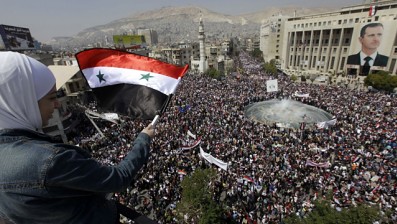
Large demonstrations in support of the Syrian government of President Bashar Al-Assad in Damascus, the capital, on March 29, 2011. The president addressed parliament on March 30 and denounced the foreign plot against the country., a photo by Pan-African News Wire File Photos on Flickr.
US seeks options for Syria intervention
Thu Dec 29, 2011 6:55PM GMT
presstv.ir
The United States has instructed the National Security Council to begin seeking options for Washington's intervention in Syria, especially through the Syrian opposition.
The options for US interference include what American officials have called the “unlikely” option of imposing a no-fly zone over the Arab country.
The process led by US National Security Council Director Steve Simon is expected to involve top members of the State, Defense and Treasury Departments and focus on ways to “aid” the Syrian opposition.
Other possibilities include providing humanitarian aid to rebel forces and establishing a “safe zone” inside Syrian territory, presumably through military means, near the Turkish border.
Establishing a no-fly zone over parts of Syria would likely involve large-scale attacks on the Syrian air defense and military command-and-control systems.
The possible resort to military force is believed to indicate the futility of a new round of sanctions the US has slapped against Damascus.
Many people, including a large number of security forces, have been killed in months of deadly unrest across Syria. The unrelenting bout of violence erupted when protests were held against and in support of President Bashar al-Assad's government.
The Syrian opposition accuses the government of cracking down on anti-government protests. But Damascus blames the ongoing unrest on foreign-backed armed gangs, arguing that army and security personnel have been given clear orders not to harm civilians.
On Wednesday, the head of an Arab League (AL) delegation investigating the unrest in Syria described the situation in the crisis-hit city of Homs as ''reassuring''.
"There were some places where the situation was not good. But there wasn't anything frightening, at least while we were there. Things were calm and there were no clashes," Sudanese General Mohamed Ahmed Mustafa al-Dabi said.
Dabi's remarks disappointed a number of Western countries, who were expecting an anti-Syria report from the AL delegation.
No comments:
Post a Comment